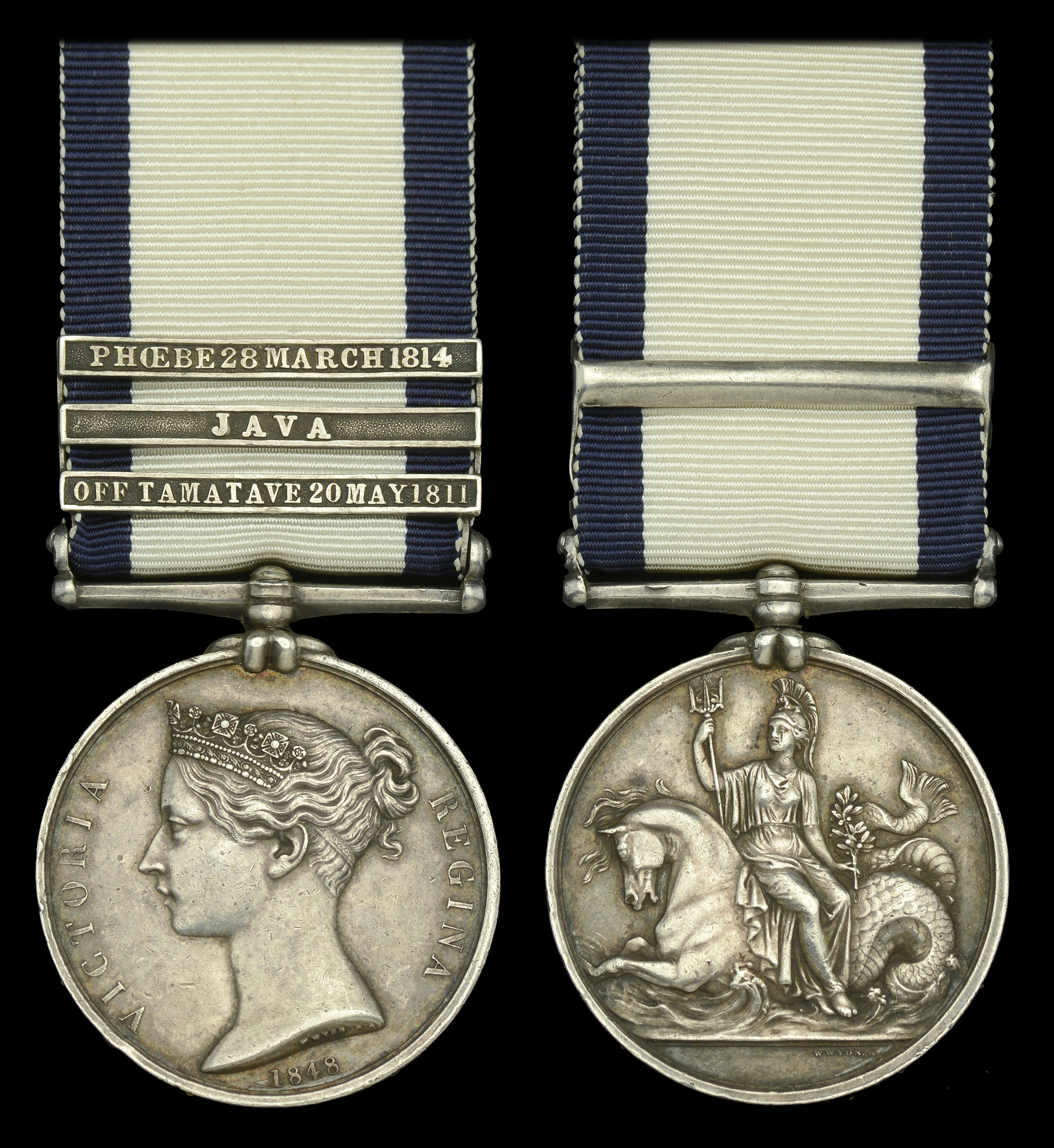The 3-clasp Naval General Service medal awarded to Thomas Millery, a sailmaker aboard the 30-gun frigate Phoebe in her various actions off Tamatave in May 1811, at the capture of Java in September 1811, and finally at the capture of the United States frigate Essex, off Valparaiso, Chile, in March 1814 Naval General Service 1793-1840, 3 clasps, Off Tamatave 20 May 1811, Java, Phœbe 28 March 1814 (Thos. Millery) toned, very fine £16,000-£20,000 --- Importation Duty This lot is subject to importation duty of 5% on the hammer price unless exported outside the UK --- --- Thomas Millery is confirmed as Acting Sailmaker aboard the Phœbe at the first two actions, and as Sailmaker aboard the same ship at the capture of the United States frigate Essex and her tender Essex Junior, off Valparaiso, Chile, on 28 March 1814. Thomas Millery was wounded in this latter action (London Gazette 1814 p1485) in which the Phœbe had four killed and seven wounded. Millery and a Marine were the only wounded men who survived to claim their medal, although the Marine - George Fieldhouse - did not claim a clasp for this particular action. The published unofficial Medal Rolls show 36 possible recipients for the Phœbe clasp, although five of these are not on the Admiralty roll (verified aboard but not on roll), and a further nine have common names which appear on other rolls. Of the remaining 22 good names/medals, three are known to be held in museums and only seven others have appeared on the market since 1887. The following report concerning the capture of the American frigate Essex was submitted by Captain Hillyar, H.M.S. Phœbe, in a letter to J. W. Croker, Secretary of the Admiralty, from Valparaiso Bay on 30 March 1814: ‘I have the honour to acquaint you, for information of the Lords Commissioners of the Admiralty, that a little past three o'clock on the afternoon of the 28th instant, after nearly five months anxious search and six weeks' still more anxious look-out for the Essex and her companion to quit the port of Valparaiso, we saw the former under weigh and immediately, accompanied by the Cherub, made sail to close with her: on rounding the outer point of the bay and hauling her wind for the purpose of endeavouring to weather us and escape, she lost her main topmast; and afterwards, not succeeding in an effort to regain the limits of the port, bore up and anchored so near the shore, a few miles to leeward of it, as to preclude the possibility of passing ahead of her without risk to his Majesty's ships. As we drew near, my intention of going close under her stern was frustrated by the ship breaking off, and, from the wind blowing extremely fresh, our first fire, commencing a little past four and condom shot only, from having increased our distance by wearing, was not apparently more successful, and, having lost the use of our mainsail, jib and main stay, appearances were a little inauspicious. On standing again towards her I signified my intention of anchoring, for which we were not ready before with springs, to Captain Tucker, directing him to keep under weigh and take a convenient station for annoying our opponent. On closing the Essex, at thirty-five minutes past five, the firing recommenced, and before I gained my intended position her cable was cut, and a serious conflict ensued, the guns of his Majesty's ship gradually becoming more destructive and her crew, if possible, more animated, which lasted until twenty minutes past six, when it pleased the Almighty disposer of events to bless the efforts of my gallant companions and my personal, very humble one with victory. My friend Captain Tucker, an officer worthy of their Lordships' best attentions, was severely wounded at the commencement of the action, but remained on deck until it terminated, using every exertion, against the baffling winds and occasional calms which followed the heavy firing, to close near the enemy. He informs me that his officers and crew, of whose loyalty, zeal and discipline I entertain the highest opinion, conducted themselves to his satisfaction. I have to lament the death of four of my brave companions, and one of his... The defence of the Essex, taking into consideration our superiority of force, the very discouraging circumstances of her having lost her main topmast and being twice on fire, did honor to her brave defenders and most fully evinced the courage of Captain Porter and those under his command: her colours were not struck until the loss in killed and wounded was so awfully great, and her shattered condition so seriously bad, as to render further resistance unavailing. I was much hurt on hearing that her men had been encouraged, when the result of the action was evidently decided, some to take to their boats and others to swim on shore: many were drowned in the attempt, sixteen were saved by the exertions of my people, and others, I believe between thirty and forty, effected their landing. I informed Captain Porter that I considered the latter, in point of honour, as my prisoners: he said the encouragement was given when the ship was on danger from fire, and I have not pressed the point. The Essex is completely stored and provisioned for at least six months, and, although much injured in her upper works, masts and rigging, is not in such a state as to give the slightest cause of alarm respecting her being able to perform a voyage to Europe with perfect safety.’





